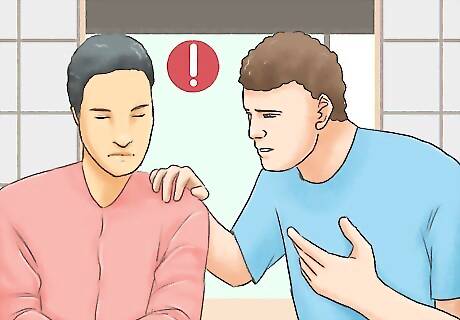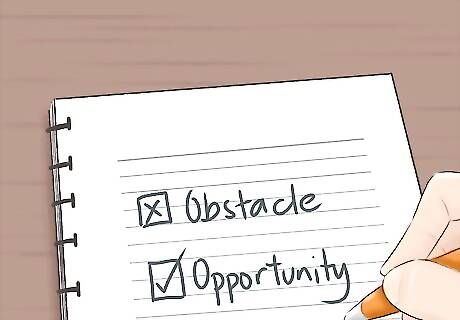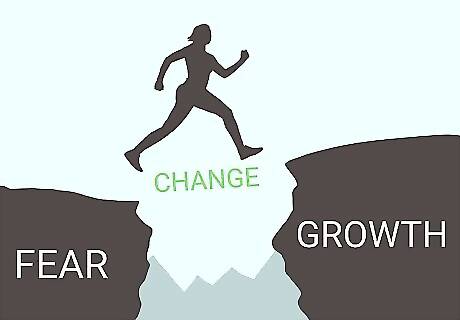
views

Realize that your character is formed or revealed most during the tough times. If you weren't tested, you'd never know the full strength of your abilities and coping skills and you'd never be aware if just how much inner strength you contain. Every person has the potential to unleash this strength provided he or she doesn't allow fear or worry take absolute control. Use this knowledge to keep you focused on what matters––getting through on your own terms. Realize that part of what you're going through is about reshaping yourself; you will need to change what isn't working for you, which can ultimately lead to a stronger and more resilient self. Did you choose this path? Sometimes the difficult situation comes about as a result of your "calling", be it faith, career, parenthood, research, or whatever. In such a case, remember why you chose this path and take strength from remembering why it matters to you.

Do not give away your agency. It can be easy to give in or give up and let someone or something else make the decisions. Falling into deep depression is a form of losing your agency, as is letting someone else make all the decisions and allowing yourself to simply fall into line, even where it doesn't suit who you are or what you wish to do. Not making a decision is also a form of reneging your agency (and it is still making a decision––to do nothing) and can harm your ability to care for yourself during the difficult situation.

Control what you can but accept that there is much which cannot be controlled. You have control over how you react and how you choose to act. You have a lot less control over what others around you choose to do and even less control over the circumstances surrounding you. It can be easy to feel helpless if you feel you cannot control what others do or say that affects you. But you do have control over the way in which you respond. As hard as this may seem––you do have choices. The real question is whether you're willing to make choices that benefit you and increase your strength to cope with the difficulties you're facing.

Seek equanimity. It is easy to give into the negative emotions of anger, frustration, anxiety and jealousy. In turn, it is often common to experience referred body pain and feel your toxic emotions through bodily pains that won't go away. It is important to acknowledge that you are experiencing these emotions, then find ways to remain composed and mentally calm while coping with difficult situations. Practicing meditation can help you to remain calm in the face of many pressures in your life. Take time out from the difficult situation. Whether it's a workout, a quick duck-out for a breather or a chat with a trusted pal, find ways to distract yourself temporarily and rejuvenate.

Use humor to help you cope. Finding humor in a difficult situation relieves tension and actually helps you to clarify the issues in creative ways. Using humor does not dismiss the seriousness of the situation; rather, it gives you the ability to cope in a positive way.

Look for silver linings. Bad situations often contain glimpses of solutions, beneficial changes and new pathways forward. If you look for the opportunities rather than staying focused on everything negative, then you give yourself a chance to grasp a way through and stay focused on the silver lining. Console yourself that there is a silver lining, if you look hard enough. Hard times can be both creative and inspiring. This may seem an odd way to view what you're going through but it is certainly a more capable one, that allows you to actively seek solutions.

Get support. The moment that you feel alone is the moment you need to reach out to others. Even if you feel that those close to you or associated with you have let you down or even distanced themselves from you, there are always people willing to help somewhere. Talk to your friends, family, doctor, therapist, or online social network (as yourself or anonymously). Talk to people who will listen and help you. If you're having suicidal thoughts and need immediate help coping, please call or text 988, in the US and Canada to reach a suicide crisis helpline. (See also How to cope with suicidal thoughts).

Understand that fear of change can hold you back. Many difficult situations arise as a result of clinging to the past. Change can be a positive when it involves growth, improvement and betterment of your life and situation. It can be tough to go through but in retrospect, many people who undergo major changes look back and realize that without the change, they'd have remained stuck in a rut. Again, return to the thought of looking for the silver lining and try to embrace change. Such a positive approach to change may lead to you coping better and turning what seems difficult around to feeling manageable. You don't have to love what you're going through, just make it bearable until it becomes your "new normal".



















Comments
0 comment